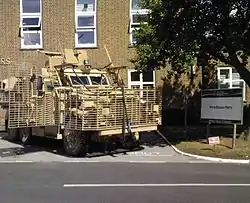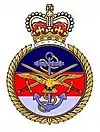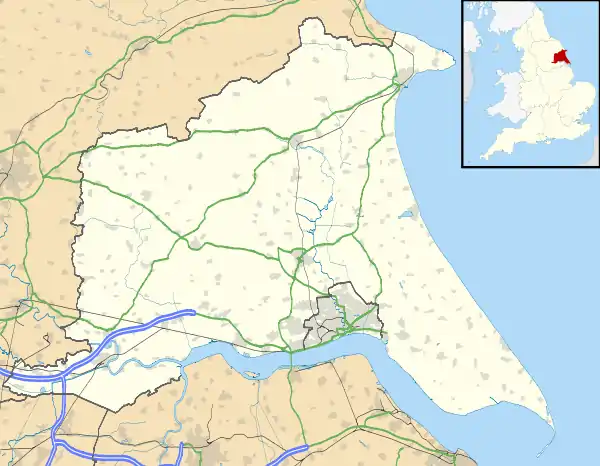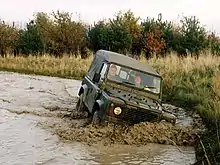Defence School of Transport
The Defence School of Transport (DST) is located at Normandy Barracks, Leconfield near Beverley, East Riding of Yorkshire in England.
| Defence School of Transport Normandy Barracks | |||||||
|---|---|---|---|---|---|---|---|
| Near Leconfield, East Riding of Yorkshire in England | |||||||
 Mastiff protective patrol vehicle outside the DST's Headquarters | |||||||
 Badge of the Defence School of Transport | |||||||
 Defence School of Transport Shown within the East Riding of Yorkshire | |||||||
| Coordinates | 53°52′46″N 000°26′00″W | ||||||
| Type | Tri-Service Training School | ||||||
| Area | 296 hectares (730 acres)[1] | ||||||
| Site information | |||||||
| Owner | Ministry of Defence | ||||||
| Operator | British Army | ||||||
| Controlled by | Defence College of Logistics, Policing and Administration | ||||||
| Site history | |||||||
| Built | 1977 | ||||||
| In use | 1977 – present | ||||||
| Airfield information | |||||||
| Elevation | 7 metres (23 ft) AMSL | ||||||
| |||||||
It is a tri-service organisation which forms part of the Defence College of Logistics Policing and Administration. It teaches driver and transport management training to personnel from the British Army, Royal Air Force and Royal Marines.
The site was formerly RAF Leconfield which closed in 1977 when the Army School of Mechanical Transport moved in. The school was renamed the Defence School of Transport in 1996, when it took on responsibility for training personnel of all three British armed forces.
History
Background
Prior to 1964, army driver training was the responsibility of 6 Driver Training Battalion at Yeovil in Somerset and 15 Driver Training Battalion at Blandford in Dorset, both of the Royal Army Service Corps (RASC). In 1965, the role was transferred to the newly formed Royal Corps of Transport (RCT) where the majority of army drivers were trained in various training establishments, one of the largest being 12 Driver Training Regiment based at Aldershot.[2]
The Army School of Mechanical Transport was formed on 1 April 1977 from a reorganisation of army driver training. The training headquarters and its Mechanical Transport Wing, along with 12 Driver Training Regiment RCT, 401 troop RCT based at South Cerney and previously separate vehicle training elements of the Royal Armoured Corps, Royal Artillery, Royal Corps of Signals, Army Air Corps and Royal Army Ordnance Corps all moved to the site of RAF Leconfield, which had closed as Royal Air Force station on 1 January 1977.[2]
Establishment
In 1996, the school was renamed the Defence School of Transport when it became responsible for training personnel in the British Army, Royal Air Force and Royal Marines.[3]
The school was awarded the freedom of the East Riding by the East Riding of Yorkshire Council in 2010.[4]
In July 2013, the demolition of existing accommodation blocks began to allow the construction of four new blocks. The £28 million project, carried out by Lendlease on behalf of the Defence Infrastructure Organisation (DIO), was completed in March 2015 and provided 768 bed spaces for students.[5][6]
25 Regiment of the Royal Logistics Corps relocated to DST in Summer 2019. This move consolidated the regiment in one location with the regimental headquarters and 109 Squadron moving from Deepcut Barracks in Surrey to Leconfield, where 110 Squadron had been based for some years.[3]
Based units
The following units are based at Normandy Barracks.[3]
British Army
- Defence School of Transport
- 25 Training Regiment, Royal Logistic Corps
- 109 Training Squadron
- 110 Training Squadron
- Communication Information Systems (CIS) Squadron
- Driver Training Squadron (DTS)
- Military Driver Training Squadron (MDTS)
- Specialist Training & Management Squadron (STMS)
- 25 Training Regiment, Royal Logistic Corps
Role and operations
_MOD_45152545.jpg.webp)
The Defence School of Transport (DST) is a tri-service organisation which forms part of the Defence College of Logistics Policing and Administration. It teaches driver and transport management training to personnel from the British Army, Royal Air Force and Royal Marines.[3] It is the world’s largest residential training establishment for fleet management and driver training and provides 150 different courses on transport matters for nearly 20,000 trainees a year, with the ability to train up to 1,500 at any one time.[7][8] It has a fleet of approximately 1,300 vehicles ranging from cars, vans and trucks to mechanical handling equipment and specialised military vehicles.[8]
The Driver Training Squadron (DTS) provides training so personnel can obtain the most common driving licence categories (Cat B, C, C+E, D and D1). The Military Driver Training Squadron (MDTS) provides driver training on military wheeled platforms such as the Land Rover Wolf and Snatch Land Rover, MAN Support Vehicles (6 and 9 tonne) and the Demountable Rack Offload and Pickup System (DROPS). The squadron also provides Basic Close Combat Skills (BCCS) and Anti-Ambush tactics to Royal Logistics Corps (RLC) troops.
The Communication Information Systems (CIS) Squadron provides training to all regular and reserve Combat Service Support Arms such as the Royal Logistic Corps, Royal Army Medical Corps and Royal Electrical and Mechanical Engineers. Training on a range of specialist vehicles and systems, such as the Bandvagn 206 all-terrain carrier and quad bikes is provided by the Specialist Training and (MT) Management Squadron (STMS).[3] The Squadron also provides classroom based training on policy, legislation, MT accounting, the carriage of dangerous goods and hazardous materials.[3]
25 Regiment RLC administers and manages the transition of all RLC drivers from basic training into their chosen career trade and ensures that basic soldier skills are maintained.[3]
Facilities

As well as the Leconfield site, there are ten satellite facilities in the south of England and a further site at Catterick in the north of England.[9]
The school has 16 kilometres (9.9 mi) of road training circuits which includes roundabouts, traffic lights, junctions, a manoeuvring area with parking bays and a purpose built 1 in 8 sloped hill. Training also takes place on local public roads. There is 26 kilometres (16 mi) of cross-country training routes featuring forty artificial obstacles, two water crossings, a lake and various pools. Parts of the training areas reflect conditions which would be encountered on deployment in locations such as Afghanistan.[10]
166,000 trees were planted to create five woodlands which are used for training in concealment and camouflage.[10][11]
References
- "Defence Estates Development Plan 2009 – Annex A (Estate Baseline 2009)" (PDF). GOV.UK. Ministry of Defence. 3 July 2009. p. 11. Retrieved 13 November 2018.
- "No failures for this driving school". Commercial Motors. 16 June 1978.
- "Our Schools and Colleges – Defence School of Transport". British Army. Retrieved 12 November 2018.
- "Leconfield's transport school honoured with Freedom of the East Riding". Hull Daily Mail. 30 June 2010. Archived from the original on 17 January 2015. Retrieved 11 January 2015.
- "DIO provides new accommodation at Europe's biggest residential driving school". GOV.UK. Defence Infrastructure Organisation. 5 March 2015. Retrieved 13 November 2018.
- "Demolition starts at Defence School of Transport". Pocklington Post. 31 July 2013. Retrieved 13 November 2018.
- "Major renovation plans for Leconfield Defence School of Transport are unveiled". Hull Daily Mail. 12 September 2012. Archived from the original on 17 January 2015. Retrieved 11 January 2015.
- "Defence School of Transport – Information Pack". British Army. 2016. p. 23. Retrieved 13 November 2018.
- "Defence School of Transport – Information Pack". British Army. 2016. p. 15. Retrieved 13 November 2018.
- "The Defence School of Transport – Information Pack". British Army. 2016. p. 19. Retrieved 13 November 2018.
- "Defence School of Transport – Information Pack". British Army. 2016. p. 30. Retrieved 13 November 2018.
External links
- Official Website
 Media related to Defence School of Transport, Leconfield at Wikimedia Commons
Media related to Defence School of Transport, Leconfield at Wikimedia Commons
